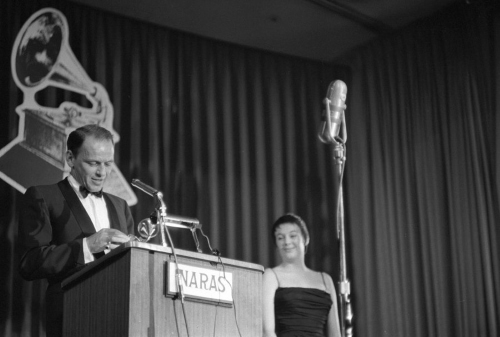The Grammy Awards (stylized as GRAMMYs) are prestigious honors presented by the Recording Academy of the United States to recognize outstanding achievements in the music industry. Often regarded as the most significant music award worldwide, the Grammys were originally called the Gramophone Awards, as the trophy depicts a gilded gramophone.

Source: billboard
Quick Facts About Grammy Awards
The Grammy Awards are prestigious accolades in the music industry, recognizing excellence in various genres and technical fields. Established in 1959, they are presented annually by The Recording Academy.
| Aspect | Details |
| Established | 1959 |
| Organized by | The Recording Academy (NARAS) |
| Country | United States |
| Purpose | Recognize excellence in the music industry |
| Major Categories | Album of the Year, Record of the Year, Song of the Year, Best New Artist |
| Number of Categories | Over 90 |
| Trophy Design | Gold-plated gramophone |
| First Ceremony | 1959, Los Angeles |
| First Album of the Year Winner | Henry Mancini – The Music from Peter Gunn (1959) |
| Most Awarded Artist | Beyoncé (32 Grammys as of 2023) |
| Most Awarded Album | Supernatural by Santana (9 awards) |
| Most Wins in a Single Night | Michael Jackson (1984) & Babyface (1996) – 8 awards each |
| Venue | Traditionally Los Angeles; also New York and others |
| Television Networks | NBC (1959–1970), ABC (1971–1972; 2027), CBS (1973–present) |
| 2025 Ceremony Date | February 2, 2025 |
| Website |
History and Evolution
The Grammy Awards originated from the Hollywood Walk of Fame project in the 1950s. Recording executives realized that many key figures in the music industry would not qualify for a Walk of Fame star, leading them to establish an award similar to the Oscars (film) and Emmys (television).
What is the purpose of giving a Grammy Award?
The Grammy Awards, presented by the Recording Academy, are accolades bestowed to recognize outstanding achievements in the music industry. They are considered one of the highest honors a musician can receive, often equated to the Oscars for film or the Emmys for television. The purpose of the Grammy Awards is multifaceted:
- Recognition and Celebration of Artistic Excellence: The Grammys acknowledge and celebrate the creative talents and technical skills of musicians, producers, songwriters, and other professionals involved in the music-making process.
- Encouragement and Inspiration: By honoring exceptional work, the awards inspire and motivate artists to push their boundaries and strive for excellence in their craft.
- Promotion and Exposure: The Grammys provide a platform for artists to gain wider recognition and exposure, potentially leading to increased sales, touring opportunities, and career advancement.
- Preservation of Musical Heritage: By documenting and recognizing significant musical contributions, the Grammy Awards preserve the rich and diverse heritage of music.
- Industry Networking and Collaboration: The Grammy Awards ceremony and related events provide opportunities for industry professionals to network, collaborate, and celebrate their shared passion for music.
Overall, the Grammy Awards serve as a vital institution within the music industry, fostering artistic growth, promoting excellence, and celebrating the power of music to connect and inspire people worldwide.
What is the Significance of the Grammy Awards?
Significance of the Grammy Awards
The Grammy Awards, presented annually by the Recording Academy, are widely considered the most prestigious awards in the music industry. They recognize outstanding achievements in various music genres, including pop, rock, rap, R&B, country, and classical.
- Cultural Impact and Recognition
- Winning a Grammy can significantly boost an artist's career, bringing increased visibility, credibility, and commercial success.
- It is a mark of artistic excellence and peer recognition, signifying that the artist's work has resonated with both critics and audiences.
-
Historical Significance:
- The Grammys have a rich history dating back to 1959. Over the years, they have honored some of the most influential and iconic figures in music, from The Beatles and Elvis Presley to Beyoncé and Kendrick Lamar.
- The awards also reflect the evolution of music and cultural trends, showcasing the diversity and innovation within the industry.
-
Industry Influence:
- The Grammys play a crucial role in shaping the music landscape. They can influence record sales, concert bookings, and artist endorsements.
- The awards also generate significant media attention and public discourse, sparking conversations about music, artistry, and cultural representation.
Award Categories
The Grammy Awards feature a vast array of categories. The most prestigious awards fall under the "General Field", which is not restricted by genre:
General Field Awards
| Award | Description |
| Album of the Year | Presented to the performer, featured artists, songwriter(s), and production team of a full album. |
| Record of the Year | Given to the performer and production team for a single song. |
| Song of the Year | Awarded to the songwriter(s) of a single song. |
| Best New Artist | Recognizes a breakthrough artist who has released their first major recording. |
| Producer of the Year (Non-Classical) | Recognizes a producer for a body of work released in the eligibility period. (Introduced in 1974) |
| Songwriter of the Year (Non-Classical) | Given to a songwriter for a body of work released in the eligibility period. (Introduced in 2023) |
Milestones
- 1959: The first Grammy Awards ceremony was held in Beverly Hills, California, and New York City simultaneously, presenting 28 awards.

Source: x.com/recordingacad
- 1971: The Grammys were broadcast live for the first time during the 13th Annual Grammy Awards.
- 2012: Major restructuring reduced the number of categories from 109 to 78, eliminating distinctions based on gender and collaborations.
- 2024: The Recording Academy announced a ten-year broadcast deal with ABC, Disney+, and Hulu, ending a long partnership with CBS.
The Road to the GRAMMY Awards: How Music’s Biggest Night Comes Together
The GRAMMY Awards are often seen as the pinnacle of achievement in the music industry. However, the journey to winning a coveted golden gramophone is a year-long process involving meticulous planning, rigorous screening, and peer-based voting. Ever wondered how the GRAMMY winners are chosen? Here’s an inside look at the process.
Step 1: Submission & Entry Process
For a recording to be eligible for consideration at the 67th GRAMMY Awards, it must have been released between September 16, 2023, and August 30, 2024. During the submission period from July 17, 2024, to August 30, 2024, artists, record labels, and Recording Academy members submit their recordings, music videos, and films through the official entry platform.
With around 20,000 entries submitted annually, this is the first crucial step in the selection process.
Who Can Submit?
- Recording Academy members (must be in good standing)
- Registered media companies
Step 2: Eligibility & Category Screening
After submission, the Recording Academy Awards Department and designated genre-specific screening committees review each entry to verify its eligibility. The screening process ensures that recordings are placed in the most appropriate categories based on genre and style. However, these committees do not make artistic or technical judgments—they strictly focus on categorization.
Genres Covered:
- Pop, Rock, R&B, Rap, Country, Jazz, Classical, Reggae, Latin, Alternative, Global Music, Songwriting, and more.
Step 3: First Round Voting (Nominee Selection)
Once entries pass the eligibility and screening stage, Recording Academy voting members—industry professionals and peers—participate in the First Round of voting to determine the nominees.
Who Votes?
- Members vote only in categories related to their areas of expertise.
- The independent accounting firm Deloitte & Touche LLP tabulates the votes.
- The top five finalists in each category become official GRAMMY nominees.
- In the General Field (which includes Album of the Year, Song of the Year, etc.), the top eight finalists advance as nominees.
Step 4: Final Round Voting (Determining the Winners)
After the nominations are announced, Recording Academy voting members proceed with the Final Round of voting. Each voter can cast votes in up to ten categories across three genre fields, plus the six general categories (such as Record of the Year and Best New Artist).
The results of this round determine the winners, who are announced during the Annual GRAMMY Awards & Premiere Ceremony.
Step 5: The GRAMMY Awards Ceremony
The journey culminates in Music’s Biggest Night, where the winners take the stage to accept their awards. The event not only celebrates musical excellence but also showcases performances by some of the most influential artists in the industry.
The GRAMMY Awards remain one of the most prestigious honors in music, recognizing creativity and excellence through a process driven entirely by peers within the industry. From submission to the final ceremony, each stage plays a crucial role in shaping the winners who will be remembered for years to come.
Congratulations Best Country Album winner - 'COWBOY CARTER' @beyonce 🎶 #GRAMMYs pic.twitter.com/jLVnG5T6aw
— Recording Academy / GRAMMYs (@RecordingAcad) February 3, 2025
Latin Grammy Awards
Due to the significant volume of Latin music entries, the Recording Academy established the Latin Grammy Awards in 2000. These awards recognize recordings in Spanish or Portuguese from anywhere in the world.
Impact of COVID-19 (2021–2022)
The pandemic led to significant disruptions:
- 63rd Grammy Awards (2021): Postponed from January 31 to March 14, 2021.
- 64th Grammy Awards (2022): Rescheduled from January 31 to April 3, 2022, and relocated from Los Angeles to Las Vegas.
Grammy Trophy: The Gramophone
| Feature | Details |
| Material | Gold-plated, made from "Grammium" (a custom zinc alloy) |
| Manufacturing | Handmade by Billings Artworks in Ridgway, Colorado |
| Design Change (1990) | Strengthened with a more durable alloy |
| Engraving Process | Winners receive engraved trophies after the announcement |
Conclusion
The Grammy Awards remain one of the most prestigious honors in the music industry, adapting over the years to changes in musical trends and societal shifts. With continuous updates to categories, partnerships, and broadcast platforms, the Grammys continue to celebrate artistic excellence worldwide.
Comments
All Comments (0)
Join the conversation